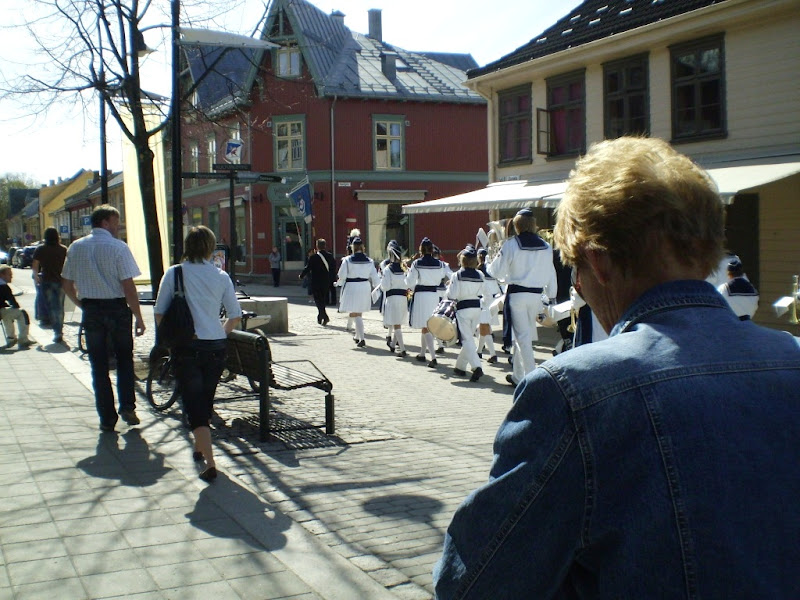Recently it was my sister, who welcomed the unseen colors of marriage in her life. This gave me a chance to observe the whole phenomena closely and served me with an understanding that, while marriage is one of the most important occasions in the life of two souls (bride and the groom), for the rest of us, it's ultimately an event or yet another gathering.
While whole of the family conundrum was restless and overly busy in synchronizing the innumerable tasks, these two souls were wandering in their own hypothetical world, quite detached from whatever is happening around. In spite of the whole day hustle-bustle they didn't know where their sleep had gone, they almost forgot to realize tiredness.
Play a prank on them, they don't mind it, tease them with anything possible, be assured to get that smile back always or give 'em some time alone, you'll realize the real importance of a mobile gadget or let anyone scold them, all they return is a silent gesture, as if they're saying, "Hmmm, thats okay, lets move on!".
It was amusing to see both of them hooked to each other almost 24 hours (metaphorically) a day. Were they enjoying the attitude of "Let go!" or better to say "the state of Detachment"?
All this caught my attention instantly and left me wondering if I can adopt such a state of detachment further in my life?
Its not that that I've not tried practicing detachment earlier but then the structured through process certainly makes any practice efficient and better. Therefore, it's important to understand detachment structurally before taking a conscious decision of practicing it.
Understanding detachment
In my sub-conscious practice of detachment earlier, I realized that detachment is widely misunderstood to be as the withdrawal from people, situations, places or life. Christians perhaps define it better as "divine indifference". But both these definitions without the deeper understanding look to be somehow misleading because detachment still doesn't stop you from sensing the needs and sufferings of others as if they are yours, which means there still is attachment left.
Even if the bride in the above example was detached, she was still involved with everyone closed to her in life, just that her consciousness now allowed her to think that it's okay if certain things are not the way, they should ideally/ supposed to be.
Looking at it this way means that even when we are detached, we still remain involved on a more divine level i.e. that of a human connection but become emotionally non-attached. I’ll perhaps redefine detachment to be as "Non-Emotional-Involvement".
But isn’t it natural for us to be attached?
Given the fact that individuals who have evolved sufficiently to manifest detachment are few and far between, if they exist at all. Without such conspicuous role models, how can we be expected to approach life in a non-attached way?
To remain motivated in life, we need it every now and then. Thus, to lead life with detachment we need to remind ourselves of practicing it until it starts reflecting into our habit.
Why should one try to learn detachment?
It seems life always has some objects in the form of people, situations, and material things etc. that keep upsetting us. Often it’s the expressions of people, circumstantial disorders that humiliate us. How to handle them in life?
Detachment can be utilized as an emotional tool that enables us to overcome such situations and empowers us to overcome our own shortcomings.
But can we really remain detached?
Transition from the stance of attachment to that of detachment can't surely be smooth. Talking about it is one thing, practicing it consistently in day-to-day life is another!
It is to be learnt however that detachment can be manifested strategically by practicing. All it needs the adoption of a thought that working with detachment is realistic and possible in its complete entirety. By practicing detachment, light of the evolution of your own consciousness benefits not only you but also the others around. Doing it with affirmation ensures for the environment to give affirmative response to you.
It may look from the outset that detachment is the personality trait but it is a mental skill that can be learnt by practice. Be patient with yourself, a conscious choice to practice non-attachment feeds immense energy to your learning process. It takes time to sort through and fine-tune all the various layers of perceptions involved.
Practicing detachment
Attachment perhaps means that the relationship with an object occupies an appreciable share of our mind space. Observing the patterns in the subconscious practice previously, I find the following steps helped practicing detachment better:
The first step to detachment is to shrink the size of the space occupied by that object in mind. Lets say, an unhealthy relationship is keeping me unfit then I should consciously try to make that relationship a smaller part of my life by making other parts of life bigger. Start to engage myself with other things I perhaps cherish; may be like sitting in the park for sometime everyday, joining the music classes, working out in the gymnasium, joining a club etc. Enriching our time with other people, places, situations and things, squeeze everyone's share in the mind. Occupy mind with new ideas and hence expanding horizons.
The second step is to realize that the other person's problem isn't yours. I can easily vouch that this statement is easy said than done, however, truth still be embraced. Recently my grand mother passed away, while practicing the last cremation rights, we asked a priest to chant some mantra(s) while someone gives fire to the body. Surprisingly this priest asked for an exorbitant amount to be paid for this service. Naturally everybody asked him to be justified while doing something of this sort but this person was just not bothered about anything but the money.
Later on I realized that it was actually our pain and not his, so it didn’t really bother him if the amount he asked was justifiable or not or if the kind of work he is charging this money for, it’s just a job for him, sooner he realizes better it is for him.
The third step is to set our boundaries, perhaps by spending less time with that object. Decline invitations upfront; use some phrases to avoid getting ensnared into hopeless situations. I have often noticed; while people talk, they try to sound too helpless (this may be an intention to involve you into the problem because it is into your capacity to solve) but I may not be willing to involve myself into it (for any reason), still I may want to express interest without offering to fix the problem. A statement like, "Hmmmm, thats really complicated, What are you going to do about it?" can help things getting better. Oh yes! I experienced all this very closely recently, which is an immense learning in itself.
The Fourth step perhaps is to practice, practice and practice
An adult is after all a child and nothing else
A child who loses a cherished object may wail and carry on like the world has come to an end but we adults perhaps know that it's the beginning for the child to get a better and bigger toy. The adult smiles and comforts the child; here the adult is exercising the detachment by wisdom gained from his life experiences.
However, if we look at ourselves, haven’t we developed so many attachments of our own (like a child develops for a toy) without any realization that they may not be ours or we may not have any control over them? Doesn’t it look like an illusive world? But we still are emotionally attached to so many things; therefore, experience emotions like anger, sorrow and grief when these attachments are taken away, Practicing detachment becomes so inevitably important to us as an adults and as they say:
"Attachment is the great fabricator of illusions; reality can be attained only by someone who is detached"




















